#aajc
Photo
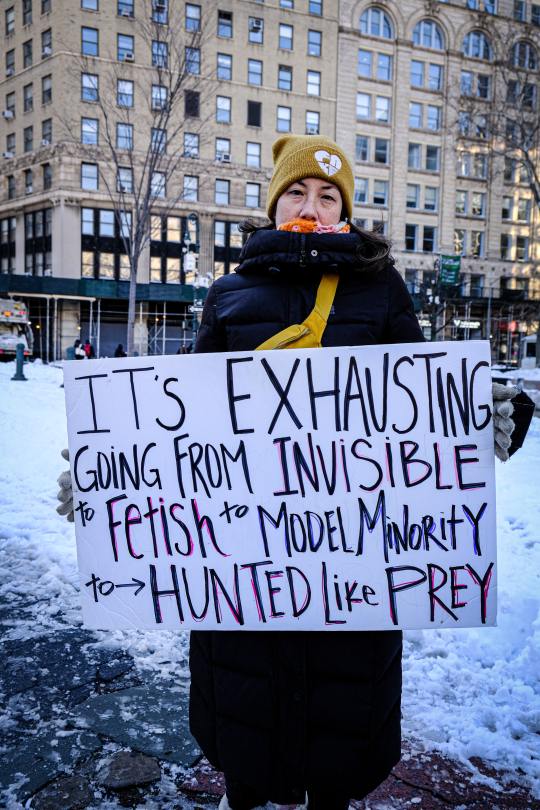
Happy Asian Pacific American Heritage Month! Find out today from the following 5 organizations how you can support the AAPI community!
➡️ 18 Million Rising (18MR)
➡️ AAPI Women Lead
➡️ Asian American Federation (AAF)
➡️ Asian Americans Advancing Justice (AAJC)
➡️ The Asian American Foundation (TAAF)
📸 by Katie Godowski on Pexels
#asian pacific american heritage month#asian#asians#asian american#asian americans#pacific islander#aapi#chinese american#korean american#filipinx#pinoy pride#asian lives matter#stop asian hate#stop aapi hate#anti asian racism#protect asian lives
88 notes
·
View notes
Text
masterpost:

my masterlist!
my rules!
my fave charities atm, to which i have personally donated :]
palestine red crescent society
palestine’s children’s relief fund
clean air task force
AAJC
air force aid society
*if you have any other recommendations please let me know!*
current status: brief hiatus/slow posts !
a key for my tags:
sharkie speaks: rants, msgs, text posts that aren’t fics, sharkie reccs/archives/faves: are reblogs of some of my fave fics!
————
about me :D
hi I’m hiraya and i write for enhypen, skz, zb1, n txt :]
entp/17/leo
i don’t bite so feel free to talk to me whenever!! (plz)
choose kindness!
20 notes
·
View notes
Text
United States lawmakers are receiving a flood of warnings from across civil society not to be bend to the efforts by some members of Congress to derail a highly sought debate over the future of a powerful but polarizing US surveillance program.
House and Senate party leaders are preparing to unveil legislation on Wednesday directing the spending priorities of the US military and its $831 billion budget next year. Rumors, meanwhile, have been circulating on Capitol Hill about plans reportedly hatched by House speaker Mike Johnson to amend the bill in an effort to extend Section 702, a sweeping surveillance program drawing fire from a large contingent of Democratic and Republican lawmakers favoring privacy reforms.
WIRED first reported on the rumors on Monday, citing senior congressional aides familiar with ongoing negotiations over the bill, the National Defense Authorization Act (NDAA), separate versions of which were passed by the House and Senate this summer.
More than 80 civil rights and grassroots organizations—including Asian Americans Advancing Justice | AAJC, Color of Change, Muslims for Just Futures, Stop AAPI Hate, and United We Dream—signed a statement this morning opposing “any efforts” to extend the 702 program using the NDAA. The statement, expected to hit the inboxes of all 535 members of Congress this afternoon, says that failure to reform contentious aspects of the program, such as federal agents’ ability to access Americans’ communications without a warrant, poses an “alarming threat to civil rights,” and that any attempt to use must-pass legislation to extend the program would “sell out the communities that have been most often wrongfully targeted by these agencies and warrantless spying powers generally.”
“As you’re aware, this extremely controversial warrantless surveillance authority is set to expire at the end of the year, but will continue to operate as it does currently until April, as government officials have recognized for many years,” the groups say.
Johnson and Senate majority leader Chuck Schumer did not respond to WIRED’s request for comment. Leadership of the House and Senate armed services committees likewise did not respond.
Section 702 of the Foreign Intelligence Surveillance Act authorizes the US government, namely, the US National Security Agency, to surveil the communications of foreign citizens believed to be overseas. Oftentimes, these communications—texts, calls, emails, and other web traffic—“incidentally” involve Americans, whom the government is forbidden from directly targeting. But certain methods of interception, those that tap directly into the internet’s backbone, may make it impossible to fully disentangle foreign communications from domestic ones.
Though a probable-cause warrant is usually required before US law enforcement can obtain the content of an American’s calls, the courts view Section 702 surveillance—accomplished with the compelled assistance of US telecoms—as a two-step process, applying constitutional safeguards to each step individually. The collection, or seizure, only “targets” foreigners and is thus legal. Once communications are in the government's possession, however, federal agents are free to query, or search, them under procedures approved by the Foreign Intelligence Surveillance Court, an 11-judge panel whose proceedings are classified and deliberated ex parte. These procedures are ostensibly designed to “minimize” the program’s impact on Americans' rights.
The “incidental,” or collateral, collection of Americans' communications is intensely controversial, due in part to procedures—namely those of the Federal Bureau of Investigation (FBI)—that allow federal agents to conduct warrantless, after-the-fact queries of Section 702 data for investigations of a purely domestic nature.
The conservative and libertarian nonprofit FreedomWorks, which has supported privacy reforms in an array of surveillance debates at the federal, state, and local levels, said Tuesday that it intends to issue a “key vote” against the NDAA in the event a Section 702 amendment is included in the bill. Key votes are a FreedomWorks scoring tool that track controversial votes by conservative lawmakers—effectively, a bad mark that may be used against them in future elections. The American Civil Liberties Union says likewise that it intends to score the vote using its own similar process, which tags progressives with votes the group deems at odds with the Bill of Rights.
“To use the NDAA to reauthorize a mass spying program that has been so flagrantly abused without going through the full legislative process and robust debate betrays the public’s trust,” says Kia Hamadanchy, senior policy counsel at the ACLU. Added FreedomWorks president Adam Brandon: “This is the time for robust debate over these issues, not maneuvers by congressional leadership to undermine Americans’ privacy. FISA reauthorization should not be in the NDAA—period.”
A single, uniform bill approved by both chambers is needed before the NDAA can be sent to the president for his signature. A conference of dozens of lawmakers, drawn in large part from the armed services committees, is expected to receive a copy of the bill on Wednesday—their first opportunity to review the consolidated text—and will have until the close of business to approve the language.
From there, the NDAA is subjected to different sets of rules for each chamber. In the Senate, it will either be ushered directly to the floor for a vote or may require three-fifths of the body to formally end debate on the NDAA. In the House, the bill may be subjected to a “rule” issued by the House Rules Committee, which is typically designed to promote the goals of party leaders, waiving points of order or limiting floor debate. The bill may also be considered “under suspension,” however, which is an expedited process that prohibits floor amendments and requires a two-thirds majority.
Senior Democratic and Republican sources say the House is expected to bypass the Rules Committee, meaning there will be no opportunity to strike down any amendments that could extend the 702 program—which is itself not typically included as part of the NDAA.
A senior Republican aide tells WIRED the odds of Johnson proceeding with a plan to extend the 702 program using the NDAA have grown slim over the past few days, as it’s become increasingly clear the speaker would face significant backlash from rank-and-file members of his own party, as well as more powerful figures such as Jim Jordan, the chairman of the House Judiciary Committee, and Matt Gaetz, one of a handful of lawmakers to whom Johnson effectively owes his new position.
A senior aide to Jordan tells WIRED that the chairman would not support extending the Section 702 program without significant reforms—in particular, a ban against the FBI accessing 702 data on Americans without a warrant.
The House and Senate intelligence committees on Tuesday introduced their own legislation to reauthorize the 702 program through 2035, banning FBI queries in criminal cases that fall outside the broadly defined “foreign intelligence” umbrella. A high-ranking source familiar with the White House’s views on the 702 program told WIRED on Monday that the White House was open to supporting this reform. Civil liberties groups, however, say requiring the FBI to obtain warrants for purely criminal matters does not go far enough, and would not impact a majority of cases in which 702 data is accessed.
What’s more, the argument goes, in matters of national security, the FBI should already be well prepared to show probable cause in court.
1 note
·
View note
Text
Polls are open in California!
Report any intimidation you experience to the local election official on site, and call one of these numbers:
866-OUR-VOTE (866-687-8683)
Spanish/English: 888-VE-Y-VOTA (NALEO Educational Fund)
Arabic/English: 844-YALLA-US (Arab American Institute/AAI)
Asian Languages/English: 888-API-VOTE (APIAVote & Asian Americans Advancing Justice/AAJC)
There are also state hotlines. Call both if you can. Most importantly, do not let anyone trying to intimidate you do so. Do not let it prevent you from voting.
Remember, if you’re in line by 8PM, you are allowed to vote regardless of when you actually reach the front of the vote centre.
3 notes
·
View notes
Text
Legislation fights back against voter suppression, updates and restores critical safeguards of the original Voting Rights Act
WASHINGTON, D.C. – U.S. Senator Tammy Baldwin (D-WI) and her colleagues introduced the John R. Lewis Voting Advancement Act, legislation to stop state voter suppression efforts, safeguard critical voting rights protections, and restore and enhance the Voting Rights Act.
In the wake of the Supreme Court’s damaging Shelby County decision in 2013—which crippled the federal government’s ability under the Voting Rights Act of 1965 to prevent discriminatory changes to voting laws and procedures—states across the country have unleashed a torrent of voter suppression schemes that have systematically disenfranchised tens of thousands of American voters. The Supreme Court’s decision in Brnovich delivered yet another blow to the Voting Rights Act, by making it significantly harder for plaintiffs to win lawsuits under the landmark law against discriminatory voting laws or procedures.
“The right to access the ballot box and have your voice heard is foundational to how our democracy and country works. Unfortunately, we have seen targeted attacks on this right in Wisconsin and across the country, and we need to put an end to it,” said Senator Baldwin. “Our bill honors the legacy of the late Congressman John Lewis and continues his work by curbing voter suppression, protecting Americans’ right to the ballot box, and ensuring the power is in the hands of the people.”
The John R. Lewis Voting Rights Advancement Act is endorsed by hundreds of organizations, including the following leading civil rights organizations: Leadership Conference on Civil and Human Rights, American Civil Liberties Union, NAACP Legal Defense and Educational Fund, Inc. (LDF), MALDEF, Lawyers’ Committee for Civil Rights Under Law, Asian Americans Advancing Justice | AAJC, Brennan Center for Justice at NYU Law, and Demos.
The legislation is led by U.S. Senators Dick Durbin (D-IL), Raphael Warnock (D-GA), and Chuck Schumer (D-NY).
0 notes
Text
NEW: Asian Americans, who were overcounted nationally in the 2020 census, may have also been undercounted in Alaska, Iowa, Kansas, Montana, New Hampshire, South Dakota and Wyoming, plus in rural parts of the Midwest, Mountain West and South, according to a report by Asian Americans Advancing Justice - AAJC
0 notes
Photo

ᜐᜎᜋ salamat | thank you for this honor @advancingjusticesocal 🙏🏽⚔️✨ Last week, we were honored in ceremony by Asian Americans Advancing Justice in LA. In reverence for Joseph Ileto, @ishileto and the Ileto family, we honor all survivors as warriors, and continue to combat Anti-Asian hatred and violence with love, education, protection and care for ourselves & our communities. ⚔️⚔️ Gratitude to everyone who sent kind words and well wishes. We are so proud of our @survivalarts community rising in strength and power through KALI! ⚔️🔥 . . #repost @advancingjusticesocal: 🏆 2022 Joseph Ileto Courage Award Recipient | Jamie Yancovitz ( @lovejamiebx ) In 1999, Joseph Ileto, a Filipino American letter carrier, was killed in a hate crime in the San Fernando Valley. His attack came after the perpetrator aimed at a Jewish school; he was the only victim who died that day. As a result, AJSOCAL worked with the Ileto family to ensure that Joseph was recognized because nationwide, initially, he was left out. In the coming years, we’ve worked closely with the family to bring attention to hate crimes, and they have been strong proponents for gun safety since. The "Ileto Courage Award” honors those inspiring change and embodying any form of courage. We proudly present this award to Jamie for her work at @survivalarts in protecting our communities! 💪 RSVP to our 39th Anniversary Gala on Thursday, October 27 at JANM on our website at ajsocal.org/events #AJSOCAL #UnitedArtinAction #JAMN #ArtistsAtWork #AJSOCAL39 #AAPI #AsianAmerican (at Asian Americans Advancing Justice - AAJC) https://www.instagram.com/p/CkhfYXuuXfO/?igshid=NGJjMDIxMWI=
0 notes
Text
Cross-Racial Solidarity Against Racist Violence: The Legacy of Vincent Chin

Forty years ago, on the eve of his wedding, a young Chinese American named Vincent Chin was fatally beaten with a baseball bat on the streets of Detroit by two white men shouting anti-Asian slurs. The miscarriage of justice that followed – neither assailant served a day in jail for the crime – marked the birth of the modern-day Asian American civil rights movement.
What made Chin’s killing even more egregious, said Helen Zia, author and veteran activist for AAPI and LGBTQ communities who worked in Detroit at the time of Chin’s murder, was that “there was no question in anybody’s minds, had the killers been black or Asian, had they not been white, they would have gone to prison for a very long time. So the sense of injustice was great.”
Zia spoke at an Ethnic Media Services briefing on May 27th to highlight plans for a special 40th anniversary commemoration of Chin’s death in Detroit (June 16-19) and efforts to build stronger cross-racial solidarity to confront today’s surge in racist violence.On June 19, 1982 Vincent Chin was beaten in a racially-motivated attack in Detroit, Michigan. The perpetrators, both of whom were white, were released on probation.
Noting the parallels between 1982 and 2022, Zia recalled that Chin’s murder occurred amidst mounting public fears that manufacturing jobs were relocating to Asia even as inflation, fueled by an oil crisis, had already hit 20%. Meanwhile the Reagan administration was dismantling social safety programs such as unemployment benefits, food stamps, and mental health services – policies whose impacts are still being felt today.
“There were people in the C-suites, the heads of the auto industries, people in the halls of Congress saying we are at war because Japan makes fuel efficient cars,” said Zia, ignoring the fact that German cars were even more fuel efficient. “It was a scapegoat to blame some external force for the difficulties that were happening internally in America.”
That has happened repeatedly in American history, Zia noted, pointing to the Chinese Exclusion Act of 1882 that banned Chinese laborers from immigrating to the U.S., and the Trump administration’s national security program that focused counterintelligence resources on fighting “Chinese espionage.”
Then, as now, Asian Americans came together with Black Americans, Arab Americans, and people from all walks of life, social classes, and faiths to denounce racist violence, Zia said, despite concentrated efforts to keep people divided, including misinformation implying that much of the rise in anti-Asian hate crimes are committed by Blacks.
‘Replacement theory’ drives racist-fueled attacks
Zia noted that the majority of assailants against Asians are white and that Black leaders – from Jesse Jackson to Stacey Abrams to Kareem Abdul-Jabbar – have denounced Asian violence, even as Asians have mobilized to support the Black Lives Matter protests in the wake of George’s Floyd murder.
“A study done by the University of Michigan that came out in the summer of 2021 shows that 75% of the attackers of Asian Americans are white,” said John C. Yang, president and CEO, Asian Americans Advancing Justice (AAJC).
https://www.youtube.com/embed/IYRIV-WatSE?feature=oembedAuthor and activist Helen Zia discusses America’s history of scapegoating Asian Americans in times of economic and social crisis.
“This hate is based on the ‘replacement theory’ in which extremists argue that all of our communities of color are seeking to replace white Christian males with guns,” Yang noted. “There’s a great deal of despair, but we’ll do all we can to help dismantle it.”
Yang spoke of the strong support he personally received from Black, Latino and Native American civil rights leaders following incidents such as the mass shooting of Asian beauticians in Atlanta last year. “There is an allyship I found among my communities of color,” he added.
Lisa Cylar Barrett, director of Policy at the NAACP Legal Defense Fund, singled out “a running narrative” that holds that if one group gets ahead automatically, another group is left out or falls behind. The narrative is perpetuated by “a white power structure that seeks to maintain control and is fearful of the growing communities of color in this country.”
“We’ve had folks in political offices and media stations, corporate representatives creating an environment where misinformation and disinformation has become normalized,” Barrett said. “And we have to do more to push back against that narrative with stories that really help folks see the humanity in one another.”
Poor data on hate crimes
Michael German, a fellow with the Brennan Center for Justice’s Liberty & National Security Program who formerly investigated white supremacists for the FBI, argues that until there is more accurate official data on hate crimes, “people won’t understand that white racism is much more common in our society, that it in many ways is foundational in our society.”
Right now, he called official data on hate crimes “so poor.”
Despite passage of the Hate Crime Statistics Act in 1990, requiring the Department of Justice to collect “accurate data,” the DOJ’s policy has been to defer the investigation of hate crimes to state and local law enforcement, though only about 15% of police departments acknowledge such crimes occur within their jurisdiction, German pointed out.
While the Bureau of Justice’s National Crime Victimization Survey reports an average of 230,000 violent hate crimes a year, the DOJ prosecutes just 25 defendants a year.
“There were always racist dog whistles that politicians would use to try to get votes,” German said. “But what’s occurring now is that they are actually openly supporting these causes, appearing at campaign events with members of right-wing militant groups.”
Speakers noted that the Biden-Harris administration has issued a directive to federal agencies to look at how they can “make racial equity real.” The Justice Department, meanwhile, is expected to release several new initiatives in the coming week aimed at addressing the recent rise in hate crimes that are mostly targeting Black and AAPI communities.
These efforts need to permeate down to other elected officials in legislatures and school boards, and to the community, the speakers agreed.
Zia also pointed to states like Illinois and New Jersey that passed bills to create curriculums for K-12 that acknowledge the real history of Asian Americans. At least nine other states are discussing similar initiatives.
Events commemorating Vincent Chin
Vincent Chin’s legacy will be honored through a series of live streaming events at Vincentchin.org. The site includes a guide translated into several Asian languages that tell the stories of cross-racial solidarity and understanding among communities and the history of civil rights in America.
Alongside other Asian-American organizations, AAJC is leading the “Unity March” on June 25, a multicultural event where Black, Indigenous, Latinx, Pacific Islander, LGBTQ+, Muslim, Sikh Arab, and Jewish people will come together in Washington D.C. to demand cultural equity and racial justice.
Originally published here
Want to read this piece in Spanish, click here
0 notes
Photo

My wife and I are baking for a cause again!!!!!! southern cali fam/friends, hit me up if you wanna make an order. Repost from @explorersbakery: I'm sure you all have seen the disturbing videos, images, and articles about the hateful acts against our AAPI communities. We want to fuel strength and hope because in adversity, we bloom! Let's stand proudly together, support, protect, and lift each other up. . @explorersbakery is back and ready with a preheated oven for our AAPI fundraiser! In addition to supporting our adoption fund #DoJoAF, for the month of April we will be donating half of the proceeds to Asian Americans Advancing Justice - Asian Law Caucus (AAJC). . OC/LA friends & fam - don't forget to place your orders! We'll take orders through tomorrow and we'll coordinate pickup/delivery through the week while we're still in town. . Bay Area peeps - we'll take orders for the last two weeks from April 16-30th! Pickup in East Bay or will coordinate delivery. . Our last adoption fundraiser was almost a year ago in June 2020, and we were able to donate over $750+ to BLM. We're ready to roll up our sleeves and put in the work to try to raise that and then some for AAJC! . If an Explorers Bakery favorite of yours is not listed, just reach out and we may be able to make it work! Secret menu items: for an add'l $5, we'll transform a whole batch of pandesal into "pande-cakes" stuffed with whipped cream and either strawberries or pineapple! . Quick shout-out to the hubs for the amazing design work he pumped out for our fundraiser...hit him up for your graphic design needs! @joebalde . #BakersAgainstRacism #StopAsianHate #InAdversityWeBloom #AAPI #AAJC #respect #peace #love #justice #antiracism #dojoadventures #explorersbakery #baketheworldabetterplace #pandesal #strawberry #pandan #coconut #baker #bakingtherapy #homebaker #homemade #bakersofinstagram #adoptiondreams #adoptionfund #baking #bakingforacause #getinmybelly #vegan #ricepudding https://www.instagram.com/p/CNQ_94mjsoB/?igshid=g3nqbpx0qjh9
#dojoaf#bakersagainstracism#stopasianhate#inadversitywebloom#aapi#aajc#respect#peace#love#justice#antiracism#dojoadventures#explorersbakery#baketheworldabetterplace#pandesal#strawberry#pandan#coconut#baker#bakingtherapy#homebaker#homemade#bakersofinstagram#adoptiondreams#adoptionfund#baking#bakingforacause#getinmybelly#vegan#ricepudding
1 note
·
View note
Text
BoxLunch is Celebrating AAPI Heritage Month
This #APAHM, @BoxLunchGifts is highlighting #AAPI stories and donating net proceeds to @AAAJ_AAJC! You can also support the NOC by clicking the link! #ad
All month long, BoxLunch is highlighting stories of the Asian American and Pacific Islander diaspora. They have also set up a special landing page that links out to merchandise that celebrates AAPI culture and fandoms. Net proceeds from purchase will also benefit AAJC.
(more…)

View On WordPress
#AAJC#AAPI#AAPI Heritage Month#Advertisement#Asian American#Asian Americans Advancing Justice#BoxLunch#Hot Topic#Merchandise
0 notes
Link
One of the many links available from the
Asian Americans Advancing Justice (AAJC)
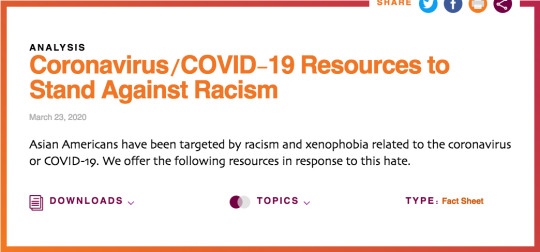
[x]
0 notes
Photo

Here's 875th photo art that I create it to celebrate the first Chinese-American actress in Hollywood, Anna May Wong early Birthday. #AnnaMayWong #zhangziyi #ziyizhang @advancingjustice_aajc @washthehate @anna_wong_official @constancewu @awkwafina #WashTheHate #aajc (at Harlem) https://www.instagram.com/p/CJjvrw2JtVv/?igshid=1j7vrnlj57h7o
0 notes
Text
hey, in light of the hate crimes in atlanta, i decided to make a thread about my experiences about what i’ve faced as an asian woman in america. https://twitter.com/petaisbough/status/1372286490978492423?s=21 pls boost and share; asian voices deserve to be heard and listened to during this time. our community in the states is constantly under attack, especially because of misinformation and stereotyping this year.

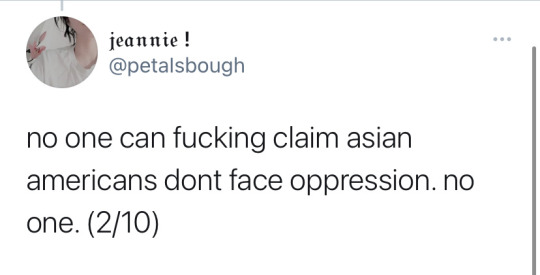
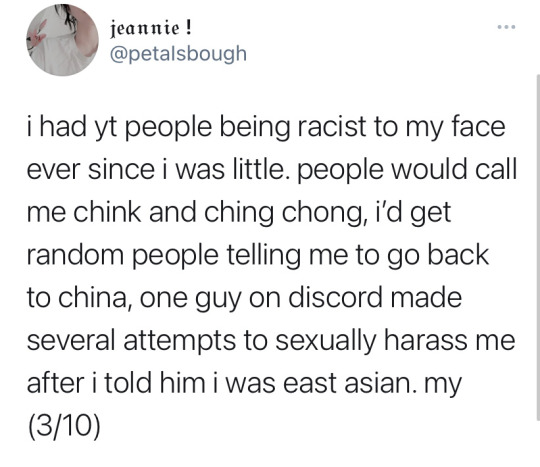


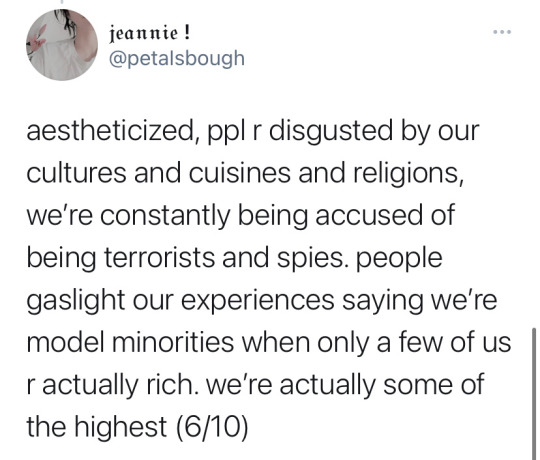
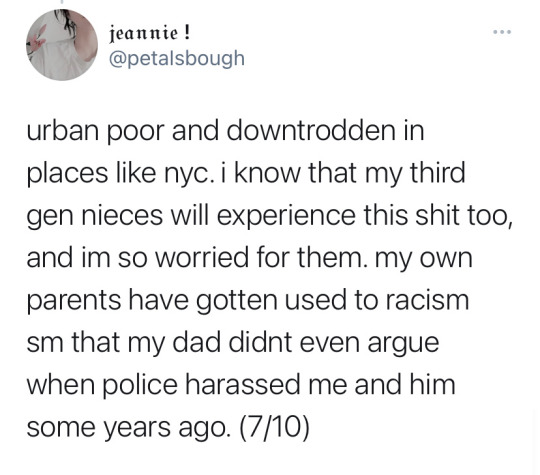
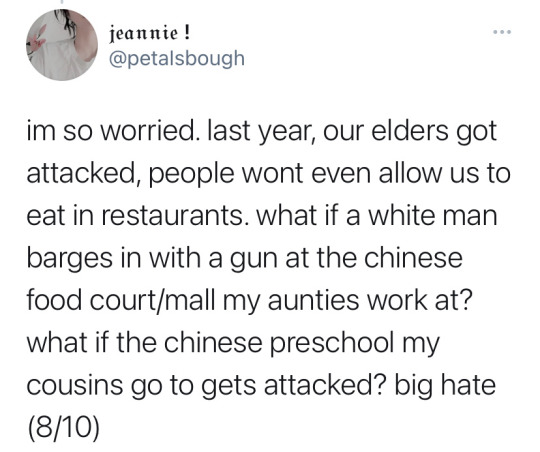


here are some charities you can donate to help us:
• red canary song — a transnational grassroots organization that works to help migrant asian sex workers
• asian immigrant women advocates — works with low income immigrant youth and workers in the san francisco bay area, seeks to empower them through education, leadership development, and collective action
• womankind — a charity that provides resources for immigrant asian woman who are survivors of domestic abuse
• asian american journalism organization — nonprofit working to ensure fair coverage of asians and asian issues in news media, as well as bring more asian diversity into newsrooms
• asian americans advancing justice — an advocacy/rights group for asian diaspora in the states, currently have an atlanta chapter
• butterfly asian and migrant sex workers support network — advocates for the rights of asian immigrant sex workers, based in toronto
#*#mine#asian american#chinese#asiansarehuman#asian voices#coronavirus#hate crimes#atlanta#atlanta spa shootings (2021)#signal boost#news#asian diaspora
523 notes
·
View notes
Text

05/06/21
We speak about Asian Americans as a single block. Here's how incredibly complex they are
Most Asians live around big cities in four states -- California, New York, Texas and Hawaii -- but for the most part, these cities are not home to a single ethnic group. About a third of all Asians in the US live in California, where there's a large Chinese population in Los Angeles County along with Filipino, Korean, Japanese, and Indian communities. Meanwhile, the Asians in Texas are Indian, Vietnamese, Chinese, Filipino, Korean, and Pakistani.
While some Asian Americans have been in the US for generations, others have come over the years under different circumstances, including refugees and asylees. An estimated two-thirds of Asian Americans and one-sixth of Pacific Islanders were born outside the country, according to Asian Americans Advancing Justice -- AAJC.
62 notes
·
View notes
Text
What Do You Need To Know About The Stop Asian Hate Movement.
Ever since it came to light that the COVID-19 virus originated in Wuhan, China, incidents of hate against Asians in America have been steadily on the rise. According to a study by the Center for the Study of Hate and Extremism at California State University, San Bernardino, there has been an increase of 150 percent in hate crimes against Asians in the US in 2020 — more than double of 2019. These include attacks on people of Asian origin as well as the businesses run by them. The study found that two of the cities, where Asians have been targeted the most are Los Angeles and New York.
Experts such as Karthick Ramakrishnan, founder and director of demographic data and policy research non-profit AAPI Data, believe that part of the hatred against Asians has been fuelled by the repeated use of “China virus” and “Kung Flu” by former US President Donald Trump, conservative media outlets as well as his supporters when referring to COVID-19. Commenting on the stereotypes that Asian Americans face in the US, John C. Yang President and Executive Director of the Asian Americans Advancing Justice (AAJC) told CNN, “Unfortunately, Asian Americans and Pacific Islanders often are invisible to the public. Or, where we are visible, it falls into a couple of different stereotypes. One stereotype is the so called ‘model minority’ — the suggestion that there are no issues that really affect the Asian American community.”
This hate, marginalisation and stereotype assumed a horrific shape on March 16, 2021, in Georgia which sent shockwaves among Asians living in America and other parts of the world.

What Happend In Georgia?
Robert Aaron Long, a 21-year-old white American, shot dead eight people at three massage parlours in Cherokee County and Atlanta city. Six of those killed were women of Asian descent. Long has been arrested and charged with eight counts of murder — four each in Cherokee and Atlanta, besides charges related to aggravated assault, attempt to murder and use of a firearm. Though Long claimed he was not motivated by the race of the victims and hate crime is not part of the charges against him, many, including Atlanta mayor Keisha Lance Bottoms, believe the mass shooting was an act of hate crime.
Has There Been Any Incident Post The Georgia Spa Shooting?
Multiple attacks on people of Asian origin have been reported across the US in the week since the Georgia spa shootings. A day after the incident, a 75-year-old woman was brutally assaulted in San Francisco. In three separate incidents on March 21 in New York City, a 54-year-old was hospitalised after being attacked, a 41-year-old was attacked from behind and a 37-year-old was assaulted on her way to an anti-Asian violence protest. While a man has been charged in the San Francisco incident, two men and a woman have been charged in the three NY incidents.
What Has Been The Response To The Attacks?
People have been highlighting these hate crime incidents on social media, raising awareness and asking everyone to look out for their Asian American family, friends and neighbours. Thousands took to the streets in New York, Atlanta, Pittsburgh, Washington and even Montreal in Canada in the last few days speaking out against anti-Asian hate, calling for police reforms and criticising Trump for his hateful rhetoric against China during the pandemic.
During one of the marches, San Antonio Mayor Juliàn Castro told demonstrators that “For generations, Asian Americans have been discriminated against. I don’t have to tell that to anybody in this crowd.”
Following the March 16 incident, the US House Judiciary Committee’s civil rights committee held a hearing on the anti-Asian bias — a first in over 30 years.

Are Prominent People Speaking Out On This Issue?
In the backdrop of the rise in hate crimes against the community, numerous celebrities have extended their support to rights groups and families of victims while expressing solidarity with Asians in America. Among them are actors Awkwafina, Lucy Liu, Sandra Oh, Olivia Munn, and Ken Jeong, designers Prabal Gurung and Yoon Ahn, models Mona Matsuoka and Soo Joo Park besides several others.
In an emotional Instagram video after the Georgia attacks, Tony Award-winning Ashley Park of Emily in Paris fame drew attention to the systemic racism that Asians face daily even “starting with children, when every Asian kid should be able to be good at math and play a classical instrument…”
“This racism starts at a very small level. It starts with things that you say. It starts when someone calls a virus that shut down the whole world the ‘Kung Flu virus.’ It also starts when you roll your eyes or make fun of Asian waiters or Chinese food delivery people and the nail artist,” she says in the post calling to stop Asian hate that has been viewed over three million times.
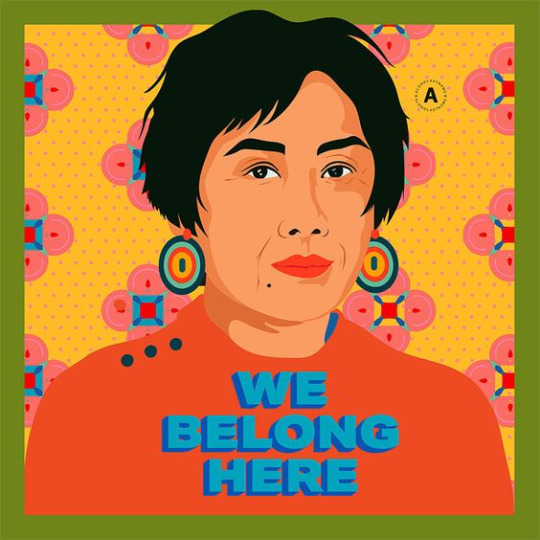
Min Jin Lee, the celebrated author of Pachinko, in support of the Stop Asian Hate movement, tweeted, “In less than 48 hours, we had a historic Asian Oscar moment with multiple firsts in 93 years — then a mass shooting targeting 3 Asian-owned businesses. This is how terrorism works — you’re not allowed to feel safe, accepted, or valued. We can resist. Take up space. Make noise.”
Appearing before the House Judiciary Subcommittee on the Constitution, Civil Rights, and Civil Liberties on March 18, The Good Doctor producer and actor Daniel Dae Kim called for the passage of the No Hate Bill and the Covid-19 Hate Crimes Act. Referring to the failure of the bill’s passage last year, he said, “I was disheartened to find that for a bill that required no money or resources, just a simple condemnation of acts of hate against people of Asian descent, 164 members of Congress, all Republican voted against it. And now here I am again, because as every witness in this hearing has pointed out, the situation has gotten worse, much worse.”
He told the committee that even though the country Asians call their home “may consider us statistically insignificant now, but one more fact that has no alternative is that we are the fastest-growing racial demographic in the country. We are 23 million strong. We are united, and we are waking up.”
Many celebrities have been raising the issue of hate incidents against members of the community for a long time. Others who have been vocal about it include tennis star and multiple Grand Slam winner Naomi Osaka, who, in a Tweet on February 7, wrote, “The amount of hate, racism, and blame for COVID towards the Asian community is disgusting. The fact that this topic is not very widely covered makes me concerned. I only found videos and information because I was scrolling through my IG feed and by some algorithm it appeared.”

#stop asian hate#stopthehate#stop asian violence#make it stop#asian lives fucking matter#asian lives matter#racisim#stop racism#all lives matter#all lives are equal#all lives fucking matter
17 notes
·
View notes
Text
最高法就哈佛案征询政府意见 媒体人称打压亚裔破坏“精英社会”
华盛顿 —
美国最高法院星期一(6月14日)要求拜登政府就大法官是否应听取哈佛大学“招生歧视”案发表意见。哈佛大学录取程序涉嫌歧视亚裔学生的案件于今年2月被上诉至美国联邦最高法院。原告“学生公平录取组织”(Students for Fair Admissions)请求最高法院禁止在大学录取决定中考虑种族因素。如果案件最终被最高法院受理,相关判决或将对美国的种族多元政策,以及帮助提高非裔和拉丁裔录取率的“平权法案”(affirmative action)产生深远影响。
“学生公平录取组织”反对在录取决定中考虑种族因素。这个组织指控哈佛大学在本科录取时歧视亚裔,包括进行“种族平衡”,给亚裔学生设定更高的标准,并且使用“个性评分”给亚裔打低分,以增加非裔等其他少数族裔的比例。组织还认为,哈佛大学在录取时过于强调种族因素,并没有考虑“种族中性”等方式,不符合最高法院判例所确立的在有限范围内考虑种族因素。
这起案件来到最高法院前曾在下级法院进行审理,下级法院做出了支持哈佛大学的判决。去年11月,波士顿的联邦巡回上诉法院的裁决认为,哈佛以有限的方式考虑种族因素,与此前最高法院的判例相一致。
最高法院寻求司法部意见
最高法院在一份命令中(Certiorari-summary Dispositions)要求司法部代理副总检察长(Acting Solicitor General)就此案提交一份摘要,“表达美国的观点”。司法部的介入可能会使案件推迟几个月的时间。最高法院星期一也没有为这起案件定下审理期限。
圣地亚哥大学法学院教授盖尔·哈利奥特(Gail Heriot)对最高法院要求拜登政府介入的决定表示失望。她对美国之音说:“这是一个重要的案子。如果美国要忠于自己的理想,它迟早必须解决大学录取中的种族歧视问题。如今,亚裔美国学生要比其他学生更优秀一些才能被哈佛这样的名校录取。这是错误的。在我看来,最高法院是在拖延时间。”
最高法院2021年已决定审议有关堕胎与枪支管控的案件。哈利奥特猜测,最高法的拖延是因为他们不想同时处理太多有争议的问题,“也许法官们认为三个这样的案件太多了”。
据路透社报道,“学生公平录取组织”主席、保守派活动人士爱德华·布鲁姆(Edward Blum)在一份声明中说,不管拜登政府的看法如何,他的组织“仍然希望大法官将批准审理我们的案件,并结束在大学招生中基于种族的平权行动。”
哈佛大学表示,在2025届学生中,大约有26%是亚裔美国人,约16%是非裔,12.5%是拉丁裔。美联社说,哈佛大学在敦促法院不要介入此案时对法庭表示:“如果哈佛放弃在录取中考虑种族因素,非裔美国人和拉丁裔美国人的人数将减少近一半。”
哈佛大学拒绝了美国之音就案件最新进展的置评请求。但该校媒体关系主任在一封电子邮件中回复美国之音说:“创建和支持一个多元化的校园社区比以往任何时候都更重要,哈佛仍然致力于这一目标。”
华盛顿智库美国进步中心在一篇文章中提到了在高校录取中应坚持平权原因,其中就包括平权行动有助于促进社会流动性,有助于各种背景学生的教育经历等。文章还说:“平权行动确保学院和大学为那些历史上因种族、民族、收入或身份而被排斥在体制之外的人提供了机会。因此,政策制定者和立法者努力在全国范围内保护种族意识录取政策的使用是至关重要的。”
长期研究种族意识录取的科罗拉多州立大学副教授潘爱欣(OiYan Poon)并没有在本案中看到歧视亚裔的证据。她还说,把种族作为众多因素之一,是将每个学生的才能和潜力在他们的教育背景下进行评估,这并不意味着种族是学生被录取或被拒绝的原因。
亚裔美国人正义促进会(AAJC)主席兼执行董事杨重远(John C. Yang)对美国之音表示:“我们相信平权法案对国家有益,对大学制度也有好处,我们希望最高法院继续肯定平权法案的有效性及其在大学环境中的适用性。”
但他也提到,哈佛案实际上是关于法院是否发现了对亚裔美国人社群的歧视,案件实际上是关于歧视而不是平权法案。原告们正试图把这个案子设为一个关于种族在招生政策上的使用的案例,但是其实这两者仍应分开来看。
Kenny Xu(东风)是一位作家,一位媒体撰稿人,也是一位活动人士,他长期关注哈佛案及种族意识录取问题。在他即将出版的新书《不便的少数族裔》(An Inconvenient Minority)中,他详细讨论了哈佛案以及对案件背后体现出的对亚裔美国人的精心谋划的攻击,他认为这种做法损害了美国的精英社会。Kenny Xu(东风)日前在接受美国之音采访时,也从自身经历谈及了他对哈佛案以及案件背后亚裔美国人处境的看法。(以下是采访内容节选,只代表受访者个人观点)
优录取与精英文化
记者问:我知道您一直都在关注哈佛大学的诉讼,您能谈谈这个案件以及案件的重要性吗?
Kenny Xu(东风):有关哈佛的诉讼非常重要,因为在谈论美国的卓越文化时,亚裔美国人是一个关键的少数群体,亚裔美国人,成就卓著,学术水平很高,如果这种文化开始与卓越背道而驰,哈佛的案例就是例证。受影响的已不仅仅是亚裔美国人,而是我们的下一代医生、工程师,商人,科学家乃至所身处这个国家的所有人。
哈佛的案子发生在2014,“学生公平录取组织”控告哈佛大学歧视他们,因为哈佛录取了条件相对较差的其他族裔和白人学生。哈佛大学称他们想要多样性,特别是种族多样性。但这里的关键点是,你可以在哪些领域用多样性换取精英教育(meritocracy)。哈佛大学在这件事上做得过界了,所以这个案子被上诉到最高法院。
问:如果最高法院最终受理这个案子,您期望的结果是什么呢?
Kenny Xu(东风):我认为这是种族意识录取的晴雨表,因为种族意识(race-conscious)录取就是在说,我们不想录取最合格的候选人,我们想录取某个族裔的候选人。如果最高法院在本案中裁定哈佛大学败诉,那么我认为裁决的延伸意义就是,我们不应该再在招生过程中考虑种族因素,我们不应该根据种族来评判人,我们不应该根据种族来限制人。所以我认为,如果最高法院判决哈佛大学败诉,这将对社会有益。
问:放弃在招生过程中考虑种族因素会不会导致更严重的种族歧视?是否会让大学更倾向于其他录取方式,比如校友子女录取?
Kenny Xu(东风):我觉得校友子女录取是另一个话题,招生就应该是择优录取,所以我觉得不应该有校友子女录取。但是如果你放弃“种族意识”的录取,这也许会对校友子女录取产生影响,因为这表明择优录取原则高于种族,也高于校友子女录取。
问:有些人会认为美国是一个包容、多元化的国家,有着多元化社会和多元化社群,所以,大学也应该海纳百川,变得更加多样化。您对这个观点有什么看法?
Kenny Xu(东风):美国人本身是多元化的。为什么你需要跨越种族的多样性,为什么这是你所关心的唯一的多样性形式,如果你录取了精英,你会发现他们有非常不同的背景和生活经历,就像亚裔美国人一样,他们的背景和生活经历都非常不同。所以我不认为多样性原则意味着你应该只关注种族多样性。
亚裔的困境与辛酸
记者问:我们知道您的新书《不便的少数族裔》将于7月面世,其中提到了哈佛案件以及亚裔美国人在多元化和包容政策下所遭遇的不公。能谈一谈您为什么想写这本书吗?
Kenny Xu(东风):我在新泽西州普林斯顿上了高中,我们学校有很多亚裔美国人。学校里有一些人能进入常春藤盟校,大家都知道,他们中的一些普通而又平庸,但是他们与学校的联系,他们的种族让他们敲开了常春藤盟校的大门。很多亚裔美国人既勤奋又努力,他们有才,他们聪明,客观地说他们学习更好,但他们却被拒绝了,我觉得这太不公平了。在这个国家,你应该奖励刻苦勤奋,你应该奖励智力能力(intellectual competence),你应该奖励优秀卓越。但现在这种文化已经遍布全国,不仅在哈佛,不仅在常春藤盟校,而是蔓延到我们的公立学校,蔓延到我们的天才项目。你看到人们试图取消入学考试,试图通过抽签来录取,甚至在我们的公司里,他们的多样性和包容性在试图雇佣某些少数族裔而不是其他少数族裔,仅仅因为某些少数族裔是特定的族裔。我觉得这把种族提升到了过高的地位。
这本书实际上是对卓越原则的探索,当你允许合法的歧视在我们的文化中蔓延,针对关键的少数族裔时,究竟会发生什么。
问:破碎的精英文化以及亚裔美国人所遭遇的困境,是否也表明渴望来到这个国家的移民们的美国梦越来越难以实现?
Kenny Xu(东风):移民们的美国梦一直都希望自己得到的待遇是基于他们勤奋地工作,他们只是想获得平等的机会,在这个国家竞争并取得成功。我认为这是最伟大的原则,但这个原则现在正受到攻击,因为有些人更喜欢基于种族来对待别人,而不是以这个人的优秀和卓越。这削弱了亚裔美国人的优秀,亚裔美国人初来乍到时没有社会特权,没有社会关系,他们只有依靠自己的能力和才能在社会上取得成功。当你失去了崇尚精英制度的人,当你没有回馈那些兢兢业业的人,那你就是在摧毁美国亚裔的优秀品质。所以我认为美国梦,真的岌岌可危。
问:您在书中提到,亚裔认识到了自身的处境,已经开始了反击,而且不仅仅是为自己而战。“他们正在努力追求一种原则,一种精英制度,这种原则不仅提升了数百万人的地位,而且建立了一种框架,使美国众多不同的人可以通过一种综合的方式公平地互动,而不是诉诸身份政治的火焰。”
Kenny Xu(东风): 是啊,亚裔美国人终于觉醒了,他们对这些问题已经沉默了太久。他们在这个国家向来没有多少政治或社会资本,但是他们开始大量积累。这是一个真正的鼓舞人心的故事,这是有关加州第16号提案的一个故事。加州第16号提案提议允许考虑种族等因素招生、招聘和公关承包,提案筹集了2800万美元。我们有一群华裔美国人,亚裔美国活动人士反对这一提案,我们筹集了大约200万美元的资金。他们筹集的金额是我们的13倍,但最终有43%人支持第16号提案,但57%的人反对考虑种族的招生和招聘。所以我认为这表明亚裔美国人真的在觉醒。
2 notes
·
View notes